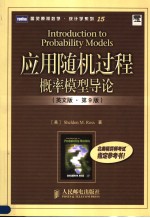图书介绍
INTRODUCTION TO PROBABILITY MODELS2025|PDF|Epub|mobi|kindle电子书版本百度云盘下载

- [美]SHELDON M.ROSS著 著
- 出版社: 人民邮电出版社
- ISBN:7115160236
- 出版时间:2007
- 标注页数:782页
- 文件大小:25MB
- 文件页数:799页
- 主题词:随机过程-英文
PDF下载
下载说明
INTRODUCTION TO PROBABILITY MODELSPDF格式电子书版下载
下载的文件为RAR压缩包。需要使用解压软件进行解压得到PDF格式图书。建议使用BT下载工具Free Download Manager进行下载,简称FDM(免费,没有广告,支持多平台)。本站资源全部打包为BT种子。所以需要使用专业的BT下载软件进行下载。如BitComet qBittorrent uTorrent等BT下载工具。迅雷目前由于本站不是热门资源。不推荐使用!后期资源热门了。安装了迅雷也可以迅雷进行下载!
(文件页数 要大于 标注页数,上中下等多册电子书除外)
注意:本站所有压缩包均有解压码: 点击下载压缩包解压工具
图书目录
1.Introduction to Probability Theory1
1.1.Introduction1
1.2.Sample Space and Events1
1.3.Probabilities Defined on Events4
1.4.Conditional Probabilities7
1.5.Independent Events10
1.6.Bayes’ Formula12
Exercises15
References21
2.Random Variables23
2.1.Random Variables23
2.2.Discrete Random Variables27
2.2.1.The Bernoulli Random Variable28
2.2.2.The Binomial Random Variable29
2.2.3.The Geometric Random Variable31
2.2.4.The Poisson Random Variable32
2.3.Continuous Random Variables34
2.3.1.The Uniform Random Variable35
2.3.2.Exponential Random Variables36
2.3.3.Gamma Random Variables37
2.3.4.Normal Random Variables37
2.4.Expectation of a Random Variable38
2.4.1.The Discrete Case38
2.4.2.The Continuous Case41
2.4.3.Expectation of a Function of a Random Variable43
2.5.Jointly Distributed Random Variables47
2.5.1.Joint Distribution Functions47
2.5.2.Independent Random Variables51
2.5.3.Covariance and Variance of Sums of Random Variables53
2.5.4.Joint Probability Distribution of Functions of Random Variables61
2.6.Moment Generating Functions64
2.6.1.The Joint Distribution of the Sample Mean and Sample Variance from a Normal Population74
2.7.Limit Theorems77
2.8.Stochastic Processes83
Exercises85
References96
3.Conditional Probability and Conditional Expectation97
3.1.Introduction97
3.2.The Discrete Case97
3.3.The Continuous Case102
3.4.Computing Expectations by Conditioning105
3.4.1.Computing Variances by Conditioning117
3.5.Computing Probabilities by Conditioning120
3.6.Some Applications137
3.6.1.A List Model137
3.6.2.A Random Graph139
3.6.3.Uniform Priors,Polya’s Urn Model,and Bose-Einstein Statistics147
3.6.4.Mean Time for Patterns151
3.6.5.The k-Record Values of Discrete Random Variables155
3.7.An Identity for Compound Random Variables158
3.7.1.Poisson Compounding Distribution161
3.7.2.Binomial Compounding Distribution163
3.7.3.A Compounding Distribution Related to the Negative Binomial164
Exercises165
4.Markov Chains185
4.1.Introduction185
4.2.Chapman-Kolmogorov Equations189
4.3.Classification of States193
4.4.Limiting Probabilities204
4.5.Some Applications217
4.5.1.The Gambler’s Ruin Problem217
4.5.2.A Model for Algorithmic Efficiency221
4.5.3.Using a Random Walk to Analyze a Probabilistic Algorithm for the Satisfiability Problem224
4.6.Mean Time Spent in Transient States230
4.7.Branching Processes233
4.8.Time Reversible Markov Chains236
4.9.Markov Chain Monte Carlo Methods247
4.10.Markov Decision Processes252
4.11.Hidden Markov Chains256
4.11.1.Predicting the States261
Exercises263
References280
5.The Exponential Distribution and the Poisson Process281
5.1.Introduction281
5.2.The Exponential Distribution282
5.2.1.Definition282
5.2.2.Properties of the Exponential Distribution284
5.2.3.Further Properties of the Exponential Distribution291
5.2.4.Convolutions of Exponential Random Variables298
5.3.The Poisson Process302
5.3.1.Counting Processes302
5.3.2.Definition of the Poisson Process304
5.3.3.Interarrival and Waiting Time Distributions307
5.3.4.Further Properties of Poisson Processes310
5.3.5.Conditional Distribution of the Arrival Times316
5.3.6.Estimating Software Reliability328
5.4.Generalizations of the Poisson Process330
5.4.1.Nonhomogeneous Poisson Process330
5.4.2.Compound Poisson Process337
5.4.3.Conditional or Mixed Poisson Processes343
Exercises346
References364
6.Continuous-Time Markov Chains365
6.1.Introduction365
6.2.Continuous-Time Markov Chains366
6.3.Birth and Death Processes368
6.4.The Transition Probability Function Pij (t)375
6.5.Limiting Probabilities384
6.6.Time Reversibility392
6.7.Uniformization401
6.8.Computing the Transition Probabilities404
Exercises407
References415
7.Renewal Theory and Its Applications417
7.1.Introduction417
7.2.Distribution of N(t)419
7.3.Limit Theorems and Their Applications423
7.4.Renewal Reward Processes433
7.5.Regenerative Processes442
7.5.1.Alternating Renewal Processes445
7.6.Semi-Markov Processes452
7.7.The Inspection Paradox455
7.8.Computing the Renewal Function458
7.9.Applications to Patterns461
7.9.1.Patterns of Discrete Random Variables462
7.9.2.The Expected Time to a Maximal Run of Distinct Values469
7.9.3.Increasing Runs of Continuous Random Variables471
7.10.The Insurance Ruin Problem473
Exercises479
References492
8.Queueing Theory493
8.1.Introduction493
8.2.Preliminaries494
8.2.1.Cost Equations495
8.2.2.Steady-State Probabilities496
8.3.Exponential Models499
8.3.1.A Single-Server Exponential Queueing System499
8.3.2.A Single-Server Exponential Queueing SystemHaving Finite Capacity508
8.3.3.A Shoeshine Shop511
8.3.4.A Queueing System with Bulk Service514
8.4.Network of Queues517
8.4.1.Open Systems517
8.4.2.Closed Systems522
8.5.The System M/G/1528
8.5.1.Preliminaries:Work and Another Cost Identity528
8.5.2.Application of Work to M/G/1529
8.5.3.Busy Periods530
8.6.Variations on the M/G/1531
8.6.1.The M/G/1 with Random-Sized Batch Arrivals531
8.6.2.Priority Queues533
8.6.3.An M/G/1 Optimization Example536
8.6.4.The M/G/1 Queue with Server Breakdown540
8.7.The Model G/M/1543
8.7.1.The G/M/ 1 Busy and Idle Periods548
8.8.A Finite Source Model549
8.9.Multiserver Queues552
8.9.1.Erlang’s Loss System553
8.9.2.The M/M/k Queue554
8.9.3.The G/M/k Queue554
8.9.4.The M/G/k Queue556
Exercises558
References570
9.Reliability Theory571
9.1.Introduction571
9.2.Structure Functions571
9.2.1.Minimal Path and Minimal Cut Sets574
9.3.Reliability of Systems of Independent Components578
9.4.Bounds on the Reliability Function583
9.4.1.Method of Inclusion and Exclusion584
9.4.2.Second Method for Obtaining Bounds on r (p)593
9.5.System Life as a Function of Component Lives595
9.6.Expected System Lifetime604
9.6.1.An Upper Bound on the Expected Life of a Parallel System608
9.7.Systems with Repair610
9.7.1.A Series Model with Suspended Animation615
Exercises617
References624
10.Brownian Motion and Stationary Processes625
10.1.Brownian Motion625
10.2.Hitting Times,Maximum Variable,and the Gambler’s Ruin Problem629
10.3.Variations on Brownian Motion631
10.3.1.Brownian Motion with Drift631
10.3.2.Geometric Brownian Motion631
10.4.Pricing Stock Options632
10.4.1.An Example in Options Pricing632
10.4.2.The Arbitrage Theorem635
10.4.3.The Black-Scholes Option Pricing Formula638
10.5.White Noise644
10.6.Gaussian Processes646
10.7.Stationary and Weakly Stationary Processes649
10.8.Harmonic Analysis of Weakly Stationary Processes654
Exercises657
References662
11.Simulation663
11.1.Introduction663
11.2.General Techniques for Simulating Continuous Random Variables668
11.2.1.The Inverse Transformation Method668
11.2.2.The Rejection Method669
11.2.3.The Hazard Rate Method673
11.3.Special Techniques for Simulating Continuous Random Variables677
11.3.1.The Normal Distribution677
11.3.2.The Gamma Distribution680
11.3.3.The Chi-Squared Distribution681
11.3.4.The Beta (n,m) Distribution681
11.3.5.The Exponential Distribution——The Von Neumann Algorithm682
11.4.Simulating from Discrete Distributions685
11.4.1.The Alias Method688
11.5.Stochastic Processes692
11.5.1.Simulating a Nonhomogeneous Poisson Process693
11.5.2.Simulating a Two-Dimensional Poisson Process700
11.6.Variance Reduction Techniques703
11.6.1.Use of Antithetic Variables704
11.6.2.Variance Reduction by Conditioning708
11.6.3.Control Variates712
11.6.4.Importance Sampling714
11.7.Determining the Number of Runs720
11.8.Coupling from the Past720
Exercises723
References731
Appendix:Solutions to Starred Exercises733
Index775
热门推荐
- 79014.html
- 538160.html
- 1544325.html
- 650749.html
- 1180844.html
- 2239732.html
- 933588.html
- 621226.html
- 845196.html
- 1688462.html
- http://www.ickdjs.cc/book_3016899.html
- http://www.ickdjs.cc/book_35606.html
- http://www.ickdjs.cc/book_146719.html
- http://www.ickdjs.cc/book_2742195.html
- http://www.ickdjs.cc/book_1902047.html
- http://www.ickdjs.cc/book_2169670.html
- http://www.ickdjs.cc/book_3514648.html
- http://www.ickdjs.cc/book_3891485.html
- http://www.ickdjs.cc/book_1027104.html
- http://www.ickdjs.cc/book_3651804.html